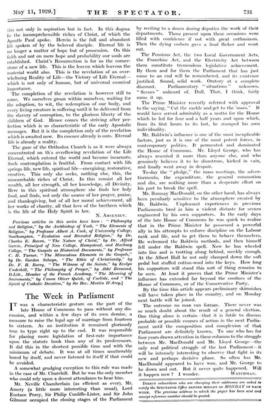The Week in Parliament
IT was a characteristic gesture on the part of the late House of Commons to pass without any dis- cussion, and within a few days of its own demise, a measure to raise the legal age of marriage from fourteen to sixteen. As an institution it remained gloriously true to type right up to the end. It was responsible for placing more legislation of first-rate importance upon the statute book than any of its predecessors. It did this in the shortest possible time and with the minimum of debate. It was at all times unutterably bored by itself, and never listened to itself if that could be avoided.
A somewhat grudging exception to this rule was made in the case of Mr. Churchill. But he was the only member who could rely upon a decent attendance to hear him.
Mr. Neville Chamberlain (as efficient as ever), Mr. Amery (a little more interesting than usual), Lord Eustace Percy, Sir Philip Cunliffe-Lister, and Sir John Eilmour occupied the closing stages of the Parliament by reciting to a dozen dozing deputies the work of their departments. Those present upon these occasions were filled with confidence if not with great enthusiasm. Then the dying embers gave a final flicker and went out.
The Pensions Act, the two Local Government Acts, the Franchise Act, and the Electricity Act between them constitute tremendous legislative achievement.
By them and for them the Parliament that has just come to an end will be remembered, and its existence justified. Sound, solid work. Oratory at a complete discount. Parliamentary " situations " unknown. " Scenes " unheard of. Dull. That, I think, fairly sums it up.
The Prime Minister recently referred with approval to the saying, " Cut the cackle and get to the 'osses." It would have served admirably as a motto for the House which he led for four and a half years and upon which, from its first hours to its last, he stamped his own individuality.
Mr. Baldwin's influence is one of the most inexplicable factors, just as it is one of the most potent forces, in contemporary politics. It permeated and dominated the House of Commons. Mr. Lloyd George, who has always resented it more than anyone else, and who genuinely believes it to be disastrous, kicked in vain, and finally went away in despair.
To-day the " pledge," the mass meetings, the adver- tisements, the expenditure, the general commotion and din, are nothing more than a desperate effort on his part to break the spell.
Mr. Ramsay MacDonald, on the other hand, has always been peculiarly sensitive to the atmosphere created by Mr. Baldwin. Unpleasant experiences in previous Parliaments bred in him a violent distaste for scenes engineered by his own supporters. In the early days of the late House of Commons he was quick to realize that in the Prime Minister he possessed a powerful ally in his attempts to enforce discipline on the Labour rank and file, and to get them to behave themselves.
He welcomed the Baldwin methods, and then himself fell under the Baldwin spell. Now he has wheeled into line and is trotting along behind, meekly enough.
At the Albert Hall he not only clamped down the soft pedal but stuffed cotton-wool into the keys. How long his supporters will stand this sort of thing remains to be seen. At least it proves that the Prime Minister's influence has extended far beyond the confines of the House of Commons, or of the Conservative Party.
By the time this article appears preliminary skirmishes will have taken place in the country, and on Monday next battle will be joined.
The outcome no man can foresee. There never was so much doubt about the result of a general election.
One thing alone is certain—that it is futile to discuss probable or possible courses of action in the next Parlia7 ment until the composition and complexion of that Parliament are definitely known. To one who has for four years drawn attention in these columns to the struggle between Mr. MacDonald and Mr. Lloyd George—the only real political struggle of the last Parliament—it will be intensely interesting to observe that fight in its new and perhaps decisive phase. So often has Mr. MacDonald appeared to have won, and Mr. George to be down and out. But it never quite happened. Will it happen now ? I wonder. WATCHMAN.










































 Previous page
Previous page